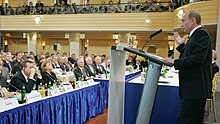Munich speech of Vladimir Putin

| ||
|---|---|---|
|
Incumbent Policies Elections Premiership
Media gallery |
||
The Munich speech of Vladimir Putin was a speech by Russian president Vladimir Putin given in Germany on 10 February 2007 at the Munich Security Conference.
The speech expressed significant points of future politics of Russia driven by Putin.[1][2][3][4]
Synopsis[]
Putin criticized what he called the United States' monopolistic dominance in global relations, and its "almost uncontained hyper use of force in international relations". The speech came to be known, especially in Russia, as the Munich speech. He said the result of such dominance was that,
[…] no one feels safe! Because no one can feel that international law is like a stone wall that will protect them. Of course such a policy stimulates an arms race.[5]
Putin also quoted from a 1990 speech by Manfred Wörner to support his position that NATO made a binding promise not to expand NATO into new countries in Eastern Europe:
He said at the time that: "the fact that we are ready not to place a NATO army outside of German territory gives the Soviet Union a firm security guarantee." Where are these guarantees?[5][6]
Putin publicly opposed plans for the U.S. missile shield in Europe, and presented President George W. Bush with a counter proposal on 7 June 2007 which was declined.[7] Russia suspended its participation in the Treaty on Conventional Armed Forces in Europe on 11 December 2007 because:
Seven years have passed and only four states have ratified this document, including the Russian Federation.[5]
Response[]
In response, former NATO secretary Jaap de Hoop Scheffer called it, "disappointing and not helpful."[8] The months following the Munich speech[5] were marked by tension and a surge in rhetoric on both sides of the Atlantic, though both Russian and American officials, however, denied the idea of a new Cold War.[9] The Polish Institute of International Affairs has described Putin's quotation from Manfred Wörner's speech as lacking appropriate context.[6]
Follow-ups[]
Putin later made other speeches that were called[10] follow-ups to the Munich speech. These include:
- The Crimean speech of Vladimir Putin in Moscow, 18 March 2014
- The Valdai speech of Vladimir Putin in Sochi, 24 October 2014
- U. N. General Assembly speech in New York, 28 September 2015 ("I'm urged to ask those who created this situation: do you at least realize now what you’ve done?")[11]
See also[]
References[]
| Wikisource has original text related to this article: |
- ^ "Putin says U.S. Wants to dominate world". Reuters. 10 February 2007.
- ^ Shanker, Thom; Landler, Mark (11 February 2007). "Putin Says U.S. Is Undermining Global Stability". The New York Times.
- ^ "Putin rails against US foreign policy". Financial Times. 10 February 2007.
- ^ "Putin Slams US for Making World More Dangerous | DW | 10.02.2007".
- ^ a b c d "Speech and the Following Discussion at the Munich Conference on Security Policy". kremlin.ru. 10 February 2007.
- ^ a b Documents Talk: NATO-Russia Relations After the Cold War. pism.pl. 2020. p. 375. ISBN 978-83-66091-61-0.
- ^ "Press Conference following the end of the G8 Summit". kremlin.ru. 8 June 2007. Retrieved 2019-06-10.
- ^ Watson, Rob (10 February 2007). "Putin's speech: Back to cold war? Putin's speech: Back to cold war?". BBC News. Retrieved 2019-06-10.
- ^ "Munich Conference on Security Policy, As Delivered by Secretary of Defense Robert M. Gates, 11 February 2007". DefenseLink. United States Department of Defense. Archived from the original on 2007-02-14.
- ^ "Munich – Valdai – Crimea".
- ^ "70th session of the UN General Assembly". kremlin.ru. 28 September 2015. Retrieved 2019-06-10.
Links[]
- 2007 in Germany
- 2007 in Russia
- 2007 in politics
- 2007 speeches
- Events in Munich
- February 2007 events in Europe
- Russia–NATO relations
- Speeches by Vladimir Putin

